标签:info 而且 canvas rect 判断 key The 指针 双缓冲
真?WPF 按钮拖动和调整大小
独立观察员 2020 年 8 月 29 日
手头有个 Winform 程序,是使用动态生成按钮,然后拖动、调整大小,以此来记录一些坐标数据,最后保存坐标数据的。
在数据量(按钮数量)比较小的时候是使用得挺愉快的,但是,当按钮数上去之后,比如达到四五百个按钮,那就比较痛苦了。具体来说就是,无论是移动窗口,还是拖动滚动条,或者是最小化窗口再还原,都会引起界面重绘,表现为按钮一个接一个地出现。
经过实测,与电脑的性能和 GPU 都没有关系,网上针对 Winform 这个问题的解决方案,比如开启双缓冲等,都大致尝试了,并无任何起色,反而可能更糟。所以就像网友所说,这个要么不要在同一个界面上放置太多控件;要么使用 WPF,毕竟 WPF 采用的是 DirectX 作为底层绘图引擎,而 Winform 则采用传统的 GDI 。由于业务需求,不让在界面上放置过多控件的方案不太可行,或者说暂未想到有什么变通的办法,所以决定改版为 WPF 试试。
经过几天的改造,原 Winform 版软件的一小部分功能已改版为 WPF 版,而且成果喜人,同样的按钮数量,现在无论怎样折腾,这几百个按钮就如同钉在了界面上一样,不再能看到他们载入的过程了。在这个改造的过程中,我是将 Winform 版软件中关于按钮拖动和调整大小的代码改造为 WPF 版的,听上去挺简单的,但是还是碰到了一些问题,比如 WPF 屏蔽了鼠标左键的一些事件,需要额外处理一下,还有的就是关于坐标定位的一些问题了,下面将给出一些关键代码,和大家相互交流学习一下。
首先,先上一道小菜,解决一下 WPF 按钮控件(Button)中文字自动换行的问题。
不对,还是先看看 Demo 的界面结构吧:
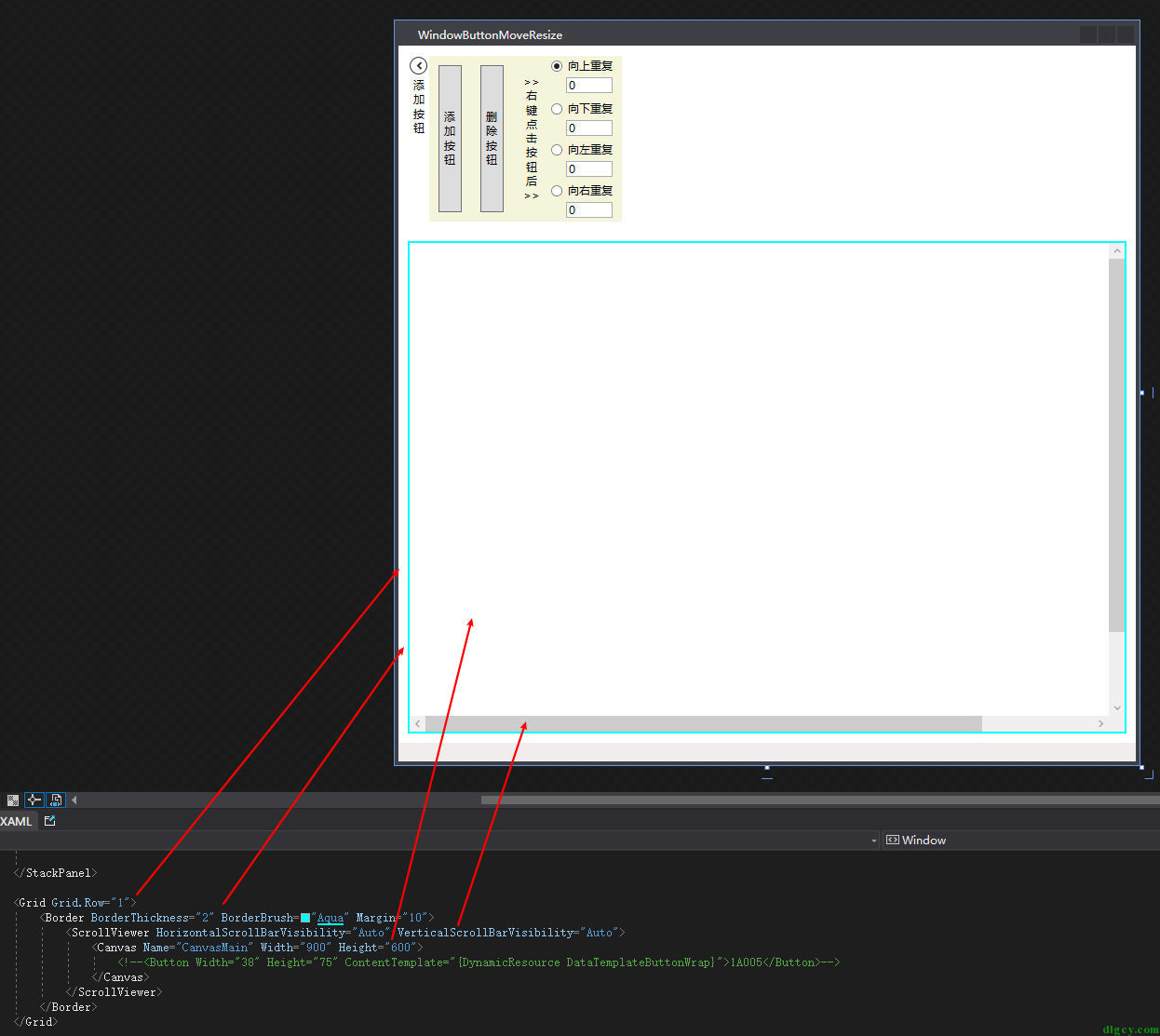
其它控件和布局就不说了(最后会给出 Demo 地址),关键的是中间这个 ScrollViewer 包裹的 Canvas,我们生成的按钮都是在这个 Canvas 上的,拖动和调整大小也是。Winform 的布局是依赖于坐标的,WPF 的布局控件则基本是不使用坐标定位的,甚至都不推荐指定大小,而只有 Canvas 布局控件保留了以坐标定位的模式,正好适合我们的需求(之前 Winform 版使用的是 Panel 控件)。
可以看到里面我还注释了一个 Button ,这个就是用来演示我们的 “小菜” 问题(按钮文字自动换行)的。我们先把注释放开,并且只保留其宽和高的设置:
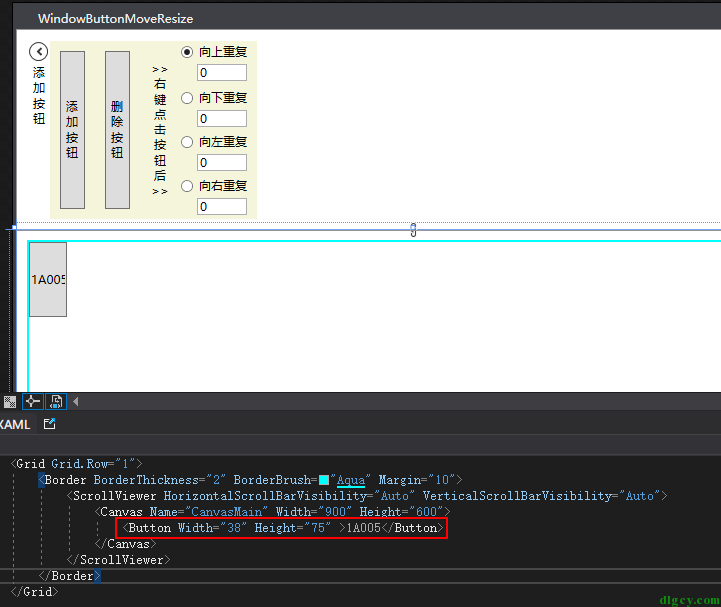
可以看到当按钮宽度窄于文本内容时,文本内容并不能进行自动换行,且 Button 控件并没有相关属性进行设置。解决方法就是在按钮中添加 TextBlock 控件,然后设置其 TextWrapping 属性,当然,这里我们不直接这样写,而是使用内容模板:
Button Width="38" Height="75" ContentTemplate="{DynamicResource DataTemplateButtonWrap}">1A005Button>
这个模板的资源放在 App.xaml 中:
Application.Resources>
DataTemplate x:Key="DataTemplateButtonWrap" DataType="Button">
Grid>
TextBlock TextWrapping="Wrap" Text="{TemplateBinding Content}">TextBlock>
Grid>
DataTemplate>
Application.Resources>
TextBlock 中使用了 TemplateBinding 将 Button 的 Content “绑架” 到了自己的 Text 中,哈哈。看看效果:
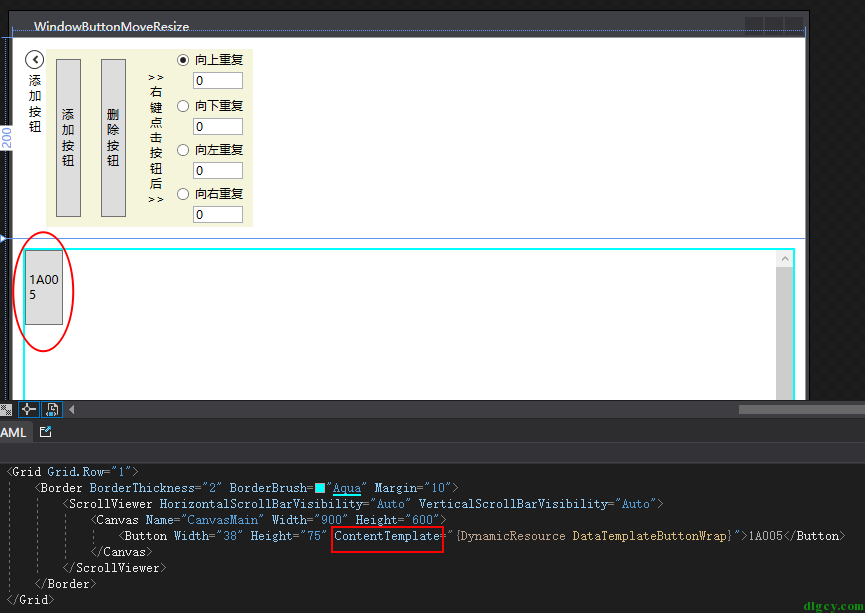
至于后台动态绑定资源则是使用 SetResourceReference 方法,后面代码里也有体现。
好了,小菜吃完了,开始吃主菜吧:
#region 成员
private Control _control;
private int _btnNum = 0;
#endregion
///
/// 设置控件在Canvas容器中的位置;
///
private void SetControlLocation(Control control, Point point)
{
Canvas.SetLeft(control, point.X);
Canvas.SetTop(control, point.Y);
}
///
/// 添加按钮
///
private void AddBtnHandler()
{
string btnContent = GetBtnContent();
Button btn = new Button
{
Name = "btn" + btnContent,
Content = "btn" + btnContent,
Width = 80,
Height = 20,
};
_control = btn;
AddContorlToCanvas(_control);
SetControlLocation(_control, new Point(163, 55));
}
///
/// 添加控件到界面;
///
///
private void AddContorlToCanvas(Control control)
{
control.MouseDown += MyMouseDown;
control.MouseLeave += MyMouseLeave;
//_control.MouseMove += MyMouseMove;
control.KeyDown += MyKeyDown;
//解决鼠标左键无法触发 MouseDown 的问题;
control.AddHandler(Button.MouseLeftButtonDownEvent, new MouseButtonEventHandler(MyMouseDown), true);
control.AddHandler(Button.MouseMoveEvent, new MouseEventHandler(MyMouseMove), true);
CanvasMain.Children.Add(control);
if (control is Button)
{
//模板中设置按钮文字换行(模板资源在App.xaml中);
control.SetResourceReference(ContentTemplateProperty, "DataTemplateButtonWrap");
_btnNum++;
}
}
///
/// 生成按钮内容
///
///
private string GetBtnContent()
{
return (_btnNum + 1).ToString().PadLeft(3, ‘0‘);
}
///
/// 删除按钮
///
private void DelBtnHandler()
{
CanvasMain.Children.Remove(_control);
}
上面代码是对按钮生成、添加到界面的一些操作逻辑,每个方法都有注释,具体的大家自己看看,这里就不在赘述了。其中 添加控件到界面 的方法 AddContorlToCanvas 中,给控件(本文指的是按钮)添加了 MouseDown、MouseLeave、MouseMove、KeyDown 等鼠标键盘事件,然后开头说过,WPF 屏蔽了 Button 的鼠标左键的一些事件,所以需要使用 AddHandler 进行处理。
下面来看看主菜中的精华:
#region 实现窗体内的控件拖动
const int Band = 5;
const int BtnMinWidth = 10;
const int BtnMinHeight = 10;
private EnumMousePointPosition _enumMousePointPosition;
private Point _point; //记录鼠标上次位置;
#region btn按钮拖动
///
/// 鼠标按下
///
private void MyMouseDown(object sender, MouseEventArgs e)
{
//选择当前的按钮
Button button = (Button)sender;
_control = button;
//Point point = e.GetPosition(CanvasMain);
//左键点击按钮后可按WSAD进行上下左右移动;
if (e.LeftButton == MouseButtonState.Pressed)
{
button.KeyDown += new KeyEventHandler(MyKeyDown);
}
double left = Canvas.GetLeft(_control);
double top = Canvas.GetTop(_control);
//右键点击按钮可向选定方向生成新按钮;
if (e.RightButton == MouseButtonState.Pressed)
{
Button btn = new Button
{
Name = "btn" + GetBtnContent(),
Content = GetStrEndNumAddOne(button.Content.ToString())
};
CheckRepeat(btn.Content.ToString());
btn.Width = _control.Width;
btn.Height = _control.Height;
if (rbUpper.IsChecked == true)//上
{
int h = txtUpper.Text.Trim() == "" ? 0 : Convert.ToInt32(txtUpper.Text.Trim());
SetControlLocation(btn, new Point(left, top - _control.Height - h));
}
if (rbLower.IsChecked == true)//下
{
int h = txtLower.Text.Trim() == "" ? 0 : Convert.ToInt32(txtLower.Text.Trim());
SetControlLocation(btn, new Point(left, top + _control.Height + h));
}
if (rbLeft.IsChecked == true)//左
{
int w = txtLeft.Text.Trim() == "" ? 0 : Convert.ToInt32(txtLeft.Text.Trim());
SetControlLocation(btn, new Point(left - _control.Width - w, top));
}
if (rbRight.IsChecked == true)//右
{
int w = txtRight.Text.Trim() == "" ? 0 : Convert.ToInt32(txtRight.Text.Trim());
SetControlLocation(btn, new Point(left + _control.Width + w, top));
}
_control = btn;
AddContorlToCanvas(_control);
}
//TODO 中键点击按钮可进行信息编辑;
}
///
/// 检查重复内容按钮
///
///
private void CheckRepeat(string content)
{
foreach (Control c in CanvasMain.Children)
{
if (c is Button btn)
{
if (content == btn.Content.ToString())
{
MessageBox.Show("出现重复按钮内容:" + content, "提示");
return;
}
}
}
}
///
/// 获取非纯数字字符串的数值加一结果;
///
private string GetStrEndNumAddOne(string str)
{
int numberIndex = 0; //数字部分的起始位置;
int charIndex = 0;
foreach (char tempchar in str.ToCharArray())
{
charIndex++;
if (!char.IsNumber(tempchar))
{
numberIndex = charIndex;
}
}
string prefix = str.Substring(0, numberIndex);
string numberStrOrigin = str.Remove(0, numberIndex);
string numberStrTemp = "";
if (numberStrOrigin != "")
{
numberStrTemp = (Convert.ToInt32(numberStrOrigin) + 1).ToString();
}
string result = "";
if (numberStrOrigin.Length numberStrTemp.Length)
{
result = prefix + numberStrTemp;
}
else
{
result = prefix + numberStrTemp.PadLeft(numberStrOrigin.Length, ‘0‘);
}
return result;
}
///
/// 鼠标离开
///
private void MyMouseLeave(object sender, EventArgs e)
{
_enumMousePointPosition = EnumMousePointPosition.MouseSizeNone;
_control.Cursor = Cursors.Arrow;
}
///
/// 鼠标移动
///
private void MyMouseMove(object sender, MouseEventArgs e)
{
_control = (Control)sender;
double left = Canvas.GetLeft(_control);
double top = Canvas.GetTop(_control);
Point point = e.GetPosition(CanvasMain);
double height = _control.Height;
double width = _control.Width;
if (e.LeftButton == MouseButtonState.Pressed)
{
switch (_enumMousePointPosition)
{
case EnumMousePointPosition.MouseDrag:
SetControlLocation(_control, new Point(left + point.X - _point.X, top + point.Y - _point.Y));
break;
case EnumMousePointPosition.MouseSizeBottom:
height += point.Y - _point.Y;
break;
case EnumMousePointPosition.MouseSizeBottomRight:
width += point.X - _point.X;
height += point.Y - _point.Y;
break;
case EnumMousePointPosition.MouseSizeRight:
width += point.X - _point.X;
break;
case EnumMousePointPosition.MouseSizeTop:
SetControlLocation(_control, new Point(left, top + point.Y - _point.Y));
height -= (point.Y - _point.Y);
break;
case EnumMousePointPosition.MouseSizeLeft:
SetControlLocation(_control, new Point(left + point.X - _point.X, top));
width -= (point.X - _point.X);
break;
case EnumMousePointPosition.MouseSizeBottomLeft:
SetControlLocation(_control, new Point(left + point.X - _point.X, top));
width -= (point.X - _point.X);
height += point.Y - _point.Y;
break;
case EnumMousePointPosition.MouseSizeTopRight:
SetControlLocation(_control, new Point(left, top + point.Y - _point.Y));
width += (point.X - _point.X);
height -= (point.Y - _point.Y);
break;
case EnumMousePointPosition.MouseSizeTopLeft:
SetControlLocation(_control, new Point(left + point.X - _point.X, top + point.Y - _point.Y));
width -= (point.X - _point.X);
height -= (point.Y - _point.Y);
break;
default:
break;
}
//记录光标拖动到的当前点
_point.X = point.X;
_point.Y = point.Y;
if (width BtnMinWidth;
if (height BtnMinHeight;
_control.Width = width;
_control.Height = height;
}
else
{
_enumMousePointPosition = GetMousePointPosition(_control, e); //‘判断光标的位置状态
switch (_enumMousePointPosition) //‘改变光标
{
case EnumMousePointPosition.MouseSizeNone:
_control.Cursor = Cursors.Arrow; //‘箭头
break;
case EnumMousePointPosition.MouseDrag:
_control.Cursor = Cursors.SizeAll; //‘四方向
break;
case EnumMousePointPosition.MouseSizeBottom:
_control.Cursor = Cursors.SizeNS; //‘南北
break;
case EnumMousePointPosition.MouseSizeTop:
_control.Cursor = Cursors.SizeNS; //‘南北
break;
case EnumMousePointPosition.MouseSizeLeft:
_control.Cursor = Cursors.SizeWE; //‘东西
break;
case EnumMousePointPosition.MouseSizeRight:
_control.Cursor = Cursors.SizeWE; //‘东西
break;
case EnumMousePointPosition.MouseSizeBottomLeft:
_control.Cursor = Cursors.SizeNESW; //‘东北到南西
break;
case EnumMousePointPosition.MouseSizeBottomRight:
_control.Cursor = Cursors.SizeNWSE; //‘东南到西北
break;
case EnumMousePointPosition.MouseSizeTopLeft:
_control.Cursor = Cursors.SizeNWSE; //‘东南到西北
break;
case EnumMousePointPosition.MouseSizeTopRight:
_control.Cursor = Cursors.SizeNESW; //‘东北到南西
break;
default:
break;
}
}
}
///
/// 按键WSAD(上下左右)
///
///
///
private void MyKeyDown(object sender, KeyEventArgs e)
{
double left = Canvas.GetLeft(_control);
double top = Canvas.GetTop(_control);
switch (e.Key)
{
case Key.W://上
{
SetControlLocation(_control, new Point(left, top-1));
break;
}
case Key.S://下
{
SetControlLocation(_control, new Point(left, top+1));
break;
}
case Key.A://左
{
SetControlLocation(_control, new Point(left-1, top));
break;
}
case Key.D://右
{
SetControlLocation(_control, new Point(left+1, top));
break;
}
}
}
#endregion 按钮拖动
#region 鼠标位置
///
/// 鼠标指针位置枚举;
///
private enum EnumMousePointPosition
{
///
/// 无
///
MouseSizeNone = 0,
///
/// 拉伸右边框
///
MouseSizeRight = 1,
///
/// 拉伸左边框
///
MouseSizeLeft = 2,
///
/// 拉伸下边框
///
MouseSizeBottom = 3,
///
/// 拉伸上边框
///
MouseSizeTop = 4,
///
/// 拉伸左上角
///
MouseSizeTopLeft = 5,
///
/// 拉伸右上角
///
MouseSizeTopRight = 6,
///
/// 拉伸左下角
///
MouseSizeBottomLeft = 7,
///
/// 拉伸右下角
///
MouseSizeBottomRight = 8,
///
/// 鼠标拖动
///
MouseDrag = 9
}
///
/// 获取鼠标指针位置;
///
///
///
///
private EnumMousePointPosition GetMousePointPosition(Control control, MouseEventArgs e)
{
Size size = control.RenderSize;
Point point = e.GetPosition(control);
Point pointCanvas = e.GetPosition(CanvasMain);
_point.X = pointCanvas.X;
_point.Y = pointCanvas.Y;
if ((point.X >= -1 * Band) | (point.X = -1 * Band) | (point.Y size.Height))
{
if (point.X Band)
{
if (point.Y Band)
{
return EnumMousePointPosition.MouseSizeTopLeft;
}
else
{
if (point.Y > -1 * Band + size.Height)
{
return EnumMousePointPosition.MouseSizeBottomLeft;
}
else
{
return EnumMousePointPosition.MouseSizeLeft;
}
}
}
else
{
if (point.X > -1 * Band + size.Width)
{
if (point.Y Band)
{
return EnumMousePointPosition.MouseSizeTopRight;
}
else
{
if (point.Y > -1 * Band + size.Height)
{
return EnumMousePointPosition.MouseSizeBottomRight;
}
else
{
return EnumMousePointPosition.MouseSizeRight;
}
}
}
else
{
if (point.Y Band)
{
return EnumMousePointPosition.MouseSizeTop;
}
else
{
if (point.Y > -1 * Band + size.Height)
{
return EnumMousePointPosition.MouseSizeBottom;
}
else
{
return EnumMousePointPosition.MouseDrag;
}
}
}
}
}
else
{
return EnumMousePointPosition.MouseSizeNone;
}
}
#endregion 鼠标位置
#endregion 实现窗体内的控件拖动
俗话说,Talk is cheap,show me the code。那么既然代码已给出,大家就直接批评指正呗,我也没什么说的了(主要是肚子饿了)。
给个效果图吧:
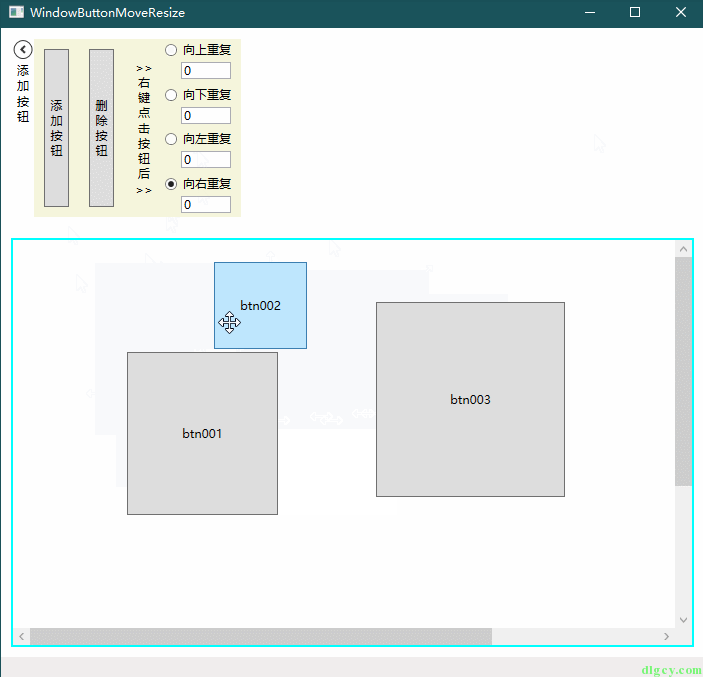
动图:
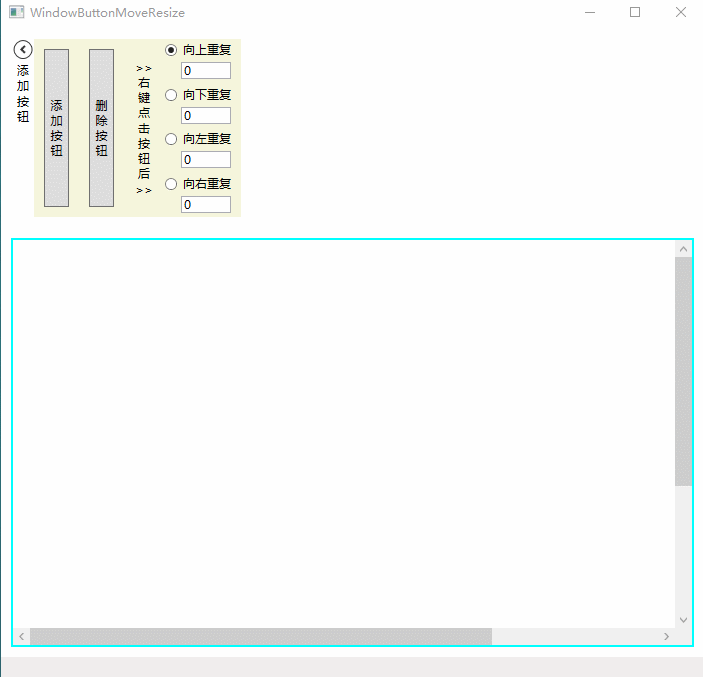
最后给出 Demo 地址:
https://gitee.com/dlgcy/Practice/tree/master/WPFPractice
同步首发:
http://dlgcy.com/real-wpf-button-drag-and-resize/
微信公众号
真?WPF 按钮拖动和调整大小
标签:info 而且 canvas rect 判断 key The 指针 双缓冲
原文地址:https://www.cnblogs.com/weiliuhong/p/real-wpf-button-drag-and-resize.html




